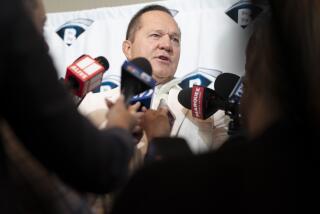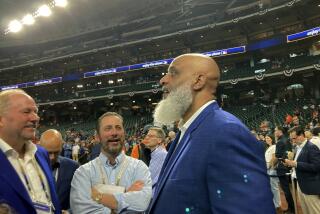It’s Now Official: Baseball to Return : Labor: Owners accept players’ offer and skip a lockout vote in the longest strike in pro sports history. The season is scheduled to open on April 26.
- Share via
CHICAGO — The longest and costliest work stoppage in professional sports history is over.
Acting baseball Commissioner Bud Selig said Sunday that major league owners have accepted the players’ unconditional offer to end a strike that began on Aug. 12.
The 1995 season, which had been scheduled to start on Sunday night with teams using replacement players, will start April 26. Each team will play 144 games, 18 fewer than normal.
Major league players are supposed to begin reporting to their respective training bases on Wednesday and must report by Friday. Some players might begin reporting today.
“It’s a black eye for baseball what we’ve had to go through, and none of us are proud of it, but we’ll try to make people appreciate the game the way it should be,” Angel pitcher Mark Langston said. “I think everyone feels a responsibility to patch up some of the garbage that has come down.”
Selig said there was no lockout vote taken by the owners during the 4 1/2-hour meeting Sunday. A management source said lawyers continued to warn owners of the legal, financial and public relations risks of a lockout during the meeting, and that the most votes hard-line owners could muster in support of a lockout was 16, five shy of what they needed.
“Bud has prided himself on the owners’ unanimity during this mess,” the source said, “and he told the owners, ‘since enough of you want to play, let’s agree to come out of here unanimous” in support of accepting the players’ offer.
The players made the offer Friday after a federal judge, responding to a petition from the National Labor Relations Board, which has charged the owners with unfair labor practice, ordered a temporary injunction forcing management to restore three key provisions of the expired labor agreement: free-agent bidding, salary arbitration and the anti-collusion clause pertaining to free agency.
In a complaint to be heard by an administrative law judge on May 22, the NLRB has accused the owners of unilaterally eliminating those mandatory subjects of collective bargaining when they agreed on Feb. 6 to withdraw the salary cap system they had implemented on Dec. 22 and restore the terms of the expired contract to avoid sanctions for declaring an illegal impasse before implementing the cap.
Despite Sunday’s decision by the owners, management lawyers will still ask the U.S. 2nd Circuit Court of Appeals for a stay of the injunction order and an expedited appeal on Tuesday.
*
If they get the stay, management lawyer Rob Manfred said, “we will have to revisit some of the issues” involved in the players’ return “but if the union does not rescind its offer to come in, we’d go ahead and play anyway.”
Union lawyer Eugene Orza, asked if a stay or successful appeal would prompt the players to withdraw the offer, left that door open.
“Our offer to return (without a bargaining agreement) was unconditional, but we have not given up the option to walk out if the conditions prove to be different than those contemplated by the injunction,” he said.
The current conditions are the same as those the players walked out on in August, exercising economic leverage against the possibility of an implemented salary cap and an attempt by the owners to break the union.
The eight-month strike has cost the players more than $200 million in salary and deprived the owners of more than $700 million in revenue. There is still no bargaining agreement, no hint of a settlement and no guarantee the players won’t strike again in August.
There is also no assurance the owners won’t attempt to declare another impasse--the injunction order requires court approval--and implement a new economic system anchored to a high-rate payroll tax.
Said union leader Donald Fehr of the owners’ decision: “It’s good news and clearly a step in the right direction. If they had voted for a lockout it would have been a clear indication they didn’t want peace at any price. The most important thing now is to get back to the (bargaining) table as quickly as we can. I think we’ve been making progress.”
President Clinton interrupted a golf vacation in Little Rock, Ark., and said the owners’ decision was “good news for the game of baseball, its fans and the local economies of the cities where baseball has been played.”
Clinton’s special mediator, William J. Usery, has been unable to resolve the bargaining dispute since being appointed on Oct. 14, and the President’s attempt to interest Congress in special legislation that would give him the authority to impose binding arbitration failed.
Lawyers for the two sides began putting back-to-work rules in place Saturday. There are more than 800 unsigned players on major league rosters, including more than 100 free agents. A new timetable for the free agent and salary arbitration procedures has to be established. The union plans to lease a training facility in Homestead, Fla., for the free agents, but the contract complexities could compound the difficulty of the teams’ attempt to prepare in less than three weeks. Union officials said they aren’t sure how long it will take to arrange visas for foreign players prevented from re-entering the United States during the strike.
Selig, meanwhile, made a point of thanking the replacement players for “interrupting their lives to help us out,” but many of them, their dreams shattered, expressed bitterness, saying they felt “used” by the owners. Some were signed to minor league contracts, but most will return to jobs out of baseball. A management edict required that all replacement players be released by midnight Saturday, saving the clubs more than $20 million in bonuses and severance.
While Selig attempted to put a positive spin on the owners’ meeting, sources said it was spirited, if not divisive, at times, with cross accusations and second-guessing between owners and lawyers regarding legal strategy in the past, present and future.
Nevertheless, even Peter Angelos, the Baltimore Oriole owner who refused to field a replacement team and has often criticized the owners’ leadership and direction, emerged in a positive mood.
*
“I’m very pleased,” he said. “Everybody is delighted that major league baseball is back with major league players. We’re all concerned with the present and future economy of the game, which is definitely in disarray and has to be attended to, but the important news is that the replacement episode is finished and baseball is back in its original form.”
While there is some concern among the owners about the absence of a guarantee against another strike by the players, many on both sides believe the players would not grant strike authorization if asked, having had enough of it over the last eight months.
Jerry McMorris, owner of the Colorado Rockies, said, “I think they know that we can’t continue to tear each other apart. We still need a deal, and the best deal is a negotiated deal. The court things will go on, but I just want to get back to baseball.”
Staff writer Mike DiGiovanna contributed to this story.
* RELATED STORIES: C1, C8
More to Read
Go beyond the scoreboard
Get the latest on L.A.'s teams in the daily Sports Report newsletter.
You may occasionally receive promotional content from the Los Angeles Times.










